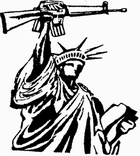Click Here to Puruse the old Flyover-press
Please Click ton Ab
Liberty knows no compromise
Click to Subscribe to Our Free Daily News Service
Donate today to help defray the costs of this important free newsletter
A Universal Ethic for All Mankind: A Detailed Review and Synopsis of The Ethics of Liberty
by Murray N. Rothbard
Chapter 7: Interpersonal Relations: Voluntary Exchange
Compiled and Edited
by
Dr. Jimmy T. (Gunny) LaBaume
At this point, Rothbard brings other men into his analysis and extends it to interpersonal relations—e.g. an analysis of the interaction of people.
Not only is production essential to man's prosperity and survival, so is exchange. This is a great truth about the natural law of human interaction. Crusoe might produce fish. Friday might grow wheat. Then, through exchange, they greatly increase the total amount of both fish and wheat. This is a result of two natural laws: (1) Individuals posses a great variety of skills and interests and (2) natural resources vary greatly across geographic areas. If these things were not true, there would be no reason for exchange.
Consider what would happen if man was suddenly prohibited from exchanging anything. The result would be utter chaos, starvation and a return to primitive subsistence for the few survivors.
Furthermore, individuals can specialize even if one of them is superior to the other in both areas of production. It still benefits even the lesser talented one to concentrate on what he does relatively best. David Ricardo summed it up in explaining his Law of Comparative Advantage. A commonly held misconception of the free market economy is that the “strong” devour or crush the “weak.” This is not so. The “weak” reap advantages on the free market simply because it benefits the “strong” to exchange with them.
This process (exchange) is essential for man's ascension from primitive isolation to civilization.
It is not the commodities themselves that are being exchanged. Instead, it is the rights to the ownership of those commodities.
Returning to Crusoe: Suppose that more people show up on the island and they each specialize in producing different products. One particular product may be characterized by the attributes of high value, steady demand and ready divisibility. Gradually this product will emerge as a medium of exchange . This expands the scope of exchange dramatically. In fact, it is a necessity for any extensive system of exchange and an advanced and civilized society.
Such a generally acceptable medium is what we call money . There are only two ways in which ownership rights can come about. The first is by finding and transforming resources (producing). The second is by exchanging one's produce for someone else's. This second way logically reduces to the first because the only way a person can obtain something in exchange is to give up his own product. In other words, the only route to ownership of goods is production and exchange.
Said another way, a man can obtain wealth by either producing it himself, or through exchange. Exchange logically reduces back to original production, which is the process by which a man “mixes his labor with the soil.” Actually, this can be done by either finding and transforming land resources or by selling one's own labor directly.
Also, wealth may be obtained voluntarily through gifts. Although the giver may only receive “psychic satisfaction,” even a gift must be preceded by production.
Furthermore exchanges in an advanced economy are “vertical and not just “horizontal” (of consumer goods). They proceed from the original transformation of land, down through the various types of capital goods, and finally to the ultimate state of consumption. For example, Smith transforms land resources to construct an axe which he sells for Jones' gold. Jones then fells lumber and sells it to Johnson who then sells it to Robbins. Finally, Robbins constructs a house in exchange for the gold of Benton.
Suppose that Jones cuts lumber and needs to ship it down-river to market. So, he sells it to Polk who hires the labor services of X, Y, and Z to transport the merchandise. Polk transfers gold to X, Y, and Z in return for their labor services. He did not sell the logs to directly to these men. Instead, he “sold” them money in exchange for their labor. X, Y, and Z could have purchased the lumber, sold it and pocketed, say, 10 extra ounces of gold. Why didn't they?
There are at least three good reasons. First, they might not have had the capital —e.g. they had not been willing to reduce their consumption sufficiently to have saved. Secondly, they may have wanted the money while they worked and were not willing to wait for it until they could sell the lumber. Finally, they may have been unwilling to bear the risk that the logs might not be saleable for a profit or even at all.
This illustrates an indispensable function of the capitalist —to save laborers from having to restrict current consumption (in order to save the capital) and from having to wait to be paid until the product is (hopefully) sold. Indeed, the capitalist does not deprive the laborer of his rightful ownership of the product. Instead, he makes possible a payment to the laborer considerably in advance. Furthermore, in his role of forecaster or entrepreneur , the capitalist enables the laborer to avoid risk.
By the same token, no one is preventing laborers from saving, purchasing capital goods, producing and selling the product, reaping the profits and thereby, themselves, becoming capitalists. It is capitalists who make possible the entire complex vertical network of exchange.
As we have seen, all ownership ultimately reduces back to three things: One is the ownership by each man of his own person and labor. The second is ownership of land which he finds unused and transforms by his labor. And the third is the exchange of the products of this resource-labor mixture with the output of other persons.
The same law holds for the money commodity. Money is either produced by someone's labor transforming original resources (gold mining) or obtained by selling one's product or previously purchased goods. Again, the only logical conclusion is that production has to come before exchange.
Some have attempted to paint the market economy as being wicked because it relies on the doctrine that labor is a commodity. The natural fact is that labor is a commodity. One's labor can be alienated and exchanged for other goods and services. However, although a person's labor is alienable, his will is not. Furthermore, if labor could not be alienated, the structure of capital required for civilization could not be developed.
A man can alienate his labor service, but he cannot sell the capitalized future value of that service. In other words, he cannot sell himself into slavery—e.g. he cannot permanently transform himself into another man's capital good. He cannot rid himself of his own will, which may change in the future. The concept of “voluntary slavery” is contradictory. If a laborer remains subservient to his master, he is not yet a slave since his submission is voluntary. Then, if he changes his mind but the master enforces his slavery by violence, the slavery would not then be voluntary.
We have seen that the free market is the exchange of property titles. Therefore it is necessarily embedded in a larger free society. And, a free society is one where property titles are founded on the basic natural facts and nature of man.
Pure liberty (a libertarian society) can be described as one where ownership titles are not “distributed.” In such a society, no man's property (be it in his person or possessions) would be molested, violated, or interfered with by anyone else. This means that every man in any society can enjoy absolute freedom. Therefore, absolute freedom need not be the price we must pay for civilization. Men are born free and need never be in chains. In other words, man can achieve both liberty and abundance. He may enjoy both freedom and civilization.
Confusing “freedom” or “liberty” with power obscures the truth. It is absurd to say that man does not have free will because he does not have the power to violate the laws of his nature. It is also absurd to say that a man is not “truly” free in the free society because, in such a society, no man is “free” to aggress against another or invade his property. Those who say such things are not really dealing with freedom but with power. In a free society, no man would be permitted (or none would permit himself) to invade the property of another. This would mean that his power of action would be limited. However, man's power is always limited by his nature so this would not mean that any of his freedom would be curtailed. Freedom to steal or assault (e.g. to aggress) would not be a state of freedom at all. That is because it would permit the victim to be deprived of his right to person and property—to have his liberty violated.
To be valid, an ethical theory must hold true for all men (at all times and in all places). We must keep that in mind if we are trying to set up an ethic for man. Natural law is applicable to all men. Therefore, it takes its place alongside physical or “scientific” laws. The society of liberty is the only society that can apply the same basic rule to every man. Reason can select one theory of natural law over a rival one. For example, it would obviously be fallacious natural rights theory to say that every man has a “natural right” to three balanced meals a day. Since there are numerous situations where it would be physically impossible to provide three balanced meals for all (or even for a majority) of the population, this cannot possibly be considered as some kind of “natural right.”
On the other hand, every person can be covered by the basic rules of ownership—e.g. the ownership of one's self, of previously unused resources which one has occupied and transformed and of all titles derived from that basic ownership.
If there is any coercive rule by one person or group over another, then it is impossible to apply the same rule for all. Since all rule involves such hegemony, only a rulerless (stateless) world can fulfill the qualifications of natural rights and law. More importantly, only in such a world can a universal ethic for all mankind be realized.
Continue to the next chapter...
*Note: We hold no special government issued licenses or permits. We don't accept government subsidies, bailouts, low-cost loans, insurance, or other privileges. We don't lobby for laws that hurt our competitors. We actively oppose protectionism and invite all foreign competitors to try to under price us. We do not lobby for tariffs, quotas, or anti-dumping laws. We do not support the government's budget deficits: we hold no government or agency securities.
To Subscribe to our daily e-mail alert service, send an e-mail with the word "subscribe" on the subject line.
Visit Our Advertisers
Email for Advertising Rates
Use the link or send an email to: adinfo@flyover-press.com

